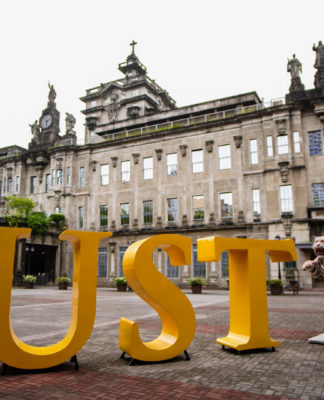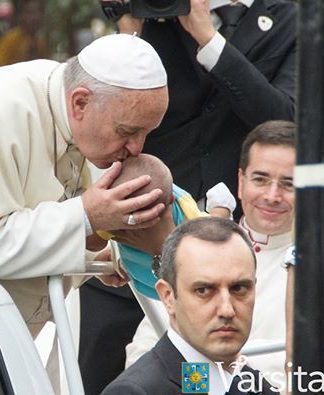FILIPINO Dominicans marked the eighth centenary of the Order of Preachers with the opening of the Jubilee Door at their mother church Santo Domingo last Nov. 7, ushering in a year-long celebration.
Reflecting on the Jubilee year’s theme “Go and Preach,” Manila Archbishop Luis Antonio Cardinal Tagle led the celebration and called on Dominican friars, sisters and laity to continue their mission of “spreading the light” of Jesus Christ.
“The Order of Preachers was given official confirmation for two reasons: to preach and to save souls. That has not changed to this day,” Cardinal Tagle said in his homily during Holy Mass. “All of our preaching, including the preaching ministry of the Order of Preachers, must always go back to Jesus who is the Word.”
He urged the Dominican community to live up to the responsibility of proclaiming the word of God and fulfilling it, stressing the importance of obedience and simplicity of life.
“Our way of life should not negate the message we wish to proclaim. The word of God is not just read, proclaimed and preached. It is fulfilled,” the prelate said.
Before the Eucharistic celebration, the cardinal led the “Rite of Opening of the Jubilee Door,” which represents Christ’s openness to pilgrims seeking for His mercy.
Fr. Filemon de la Cruz, O.P., socius of the provincial of the Dominican Province of the Philippines and vice rector for religious affairs of UST, started the celebration by reading a message from Fr. Bruno Cadore, O.P., master of the Order of Preachers.
“The resurrection of Christ is the revelation of the mercy of God for the poor. Preach the resurrection to preach a new path of friendship with God,” Fr. Cadore said in his message.
After the Holy Mass, candles were lighted and members of the order sang “Tell the World of His Love,” the 1995 World Youth Day theme song.
“Laudare, Benedicere, Praedicare,” the official theme song of the global Dominican Jubilee celebrations composed by Filipino Dominican Fr. Guiseppe Arsciwals, O.P., was also sung.
Plenary indulgence
Pope Francis has granted a plenary indulgence to those who will take part in the Dominican Jubilee events, including those who will hold pilgrimages to Dominican churches.
“The experience of mercy, indeed, becomes visible in the witness of concrete signs as Jesus himself taught us. Each time that one of the faithful personally performs one or more of these actions, he or she shall surely obtain the Jubilee Indulgence,” the Pontiff said in a letter last Sept. 1.
Fr. Ivan Obando, O.P., provincial secretary, said more activities were lined up for the Jubilee year.
“This is a spiritual year; we have started it by celebrating the thanksgiving Eucharist, and the granting of plenary indulgences to those people who will be coming to our churches and joining us for the celebration,” he told the Varsitarian.
Family retreat
Prior to the Jubilee opening, Fr. Timothy Radcliffe, O.P., former master of the Order, led the Asia-Pacific Dominican Family Retreat last Oct. 12-14 at the Quadricentennial Pavilion, where he reiterated the importance of forgiveness, humility, and concern for others.
“If we believe in God’s forgiveness, then even in the desert of our lives, God could bring fertility,” he said before 1,200 religious and lay people who took part in the retreat.
Fr. Radcliffe said true happiness could be attained through selflessness.
“Happiness starts when we stop caring just about ourselves. The culmination of our freedom and joy is when we give away our lives just like what Jesus did,” said Fr. Radcliffe, who was awarded the Santo Domingo Preaching Award by the Institute of Preaching.
Renewal begins with humility, Lingayen-Dagupan Archbishop Socrates Villegas, president of the Catholic Bishops’ Conference of the Philippines and member of the Dominican Clerical Fraternity of the Philippines, said.
“Kneel down for mercy and adoration. Kneel down to wash one another’s feet. We cannot wash one another’s feet without kneeling down. The goal of all preaching is service,” Villegas said in his homily during the retreat’s opening Mass.
The Dominican Family Leaders’ Conference was held after the retreat to allow Dominican superiors to discuss various ways to celebrate the eighth centenary of the order.
Domnet turns 20
Youth from Dominican schools all over the country meanwhile marked the Jubilee as well as the 20th anniversary of the Dominican Network (Domnet) during the second installment of “Adonai” youth rally at Colegio de San Juan de Letran in Calamba last Nov. 14 to 15.
Schools that took part in the event were UST, Letran-Calamba, Dominican College of San Juan, Holy Rosary College, Gerona Catholic School, Dominican School of Sta. Rita, Sta. Catalina College of Manila, St. Rose Catholic School, St. Mary’s Dominican School, Dominican School of Apalit, Sta. Catalina Laguna, Siena College of Quezon City, and the Dominican Academy of Unisan.
Fr. Christopher Jeffrey Aytona, O.P., national adviser of Domnet, said the 800th year of the Dominican order was a source of pride and a call for the renewal of the Dominican mission.
“This is our original calling, preaching. How we can renew, how we can respond to the challenges of this time, especially on how we preach the Word of God—that’s the greatest challenge,” he said.
Fr. Lauro de Dios, O.P., chairman of Domnet Western Visayas, said the main reason behind the order’s 800 years of existence was God’s presence in its ministry.
“We stayed this long because we are faithful to our mission. From the very beginning when the Order was founded it’s really clear that we have to preach the Word of God as Jesus commanded his apostles. At the same time, we do this preaching for the salvation of souls,” he said in an interview with the Varsitarian.
Founding of the order
The Order of Preachers was founded by St. Dominic de Guzman of Caleruega, Spain in the 1200s, and was confirmed in 1216 by Pope Honorius II.
The first Dominicans to arrive in the Philippines were Cristobal de Salvatierra and Domingo de Salazar, first bishop of Manila, in 1581. A larger group of Dominican missionaries arrived in 1587.
Filipino Dominicans formed their own province in 1971, separating from the Spanish missionary province of the Holy Rosary.
The Filipino Dominicans run 16 convents, including the Priory of St. Thomas Aquinas in UST and Santo Domingo Convent in Quezon City. They administer the Shrine of Our Lady of Manaoag in Pangasinan, which was recently declared a basilica minore and an affiliate of the Papal Basilica of St. Mary Major in Rome.
The Dominicans also run more than 10 educational institutions in the country, including the Pontifical University of Santo Tomas. K.N.A. Sevilla and L.M.P. Vicencio
















